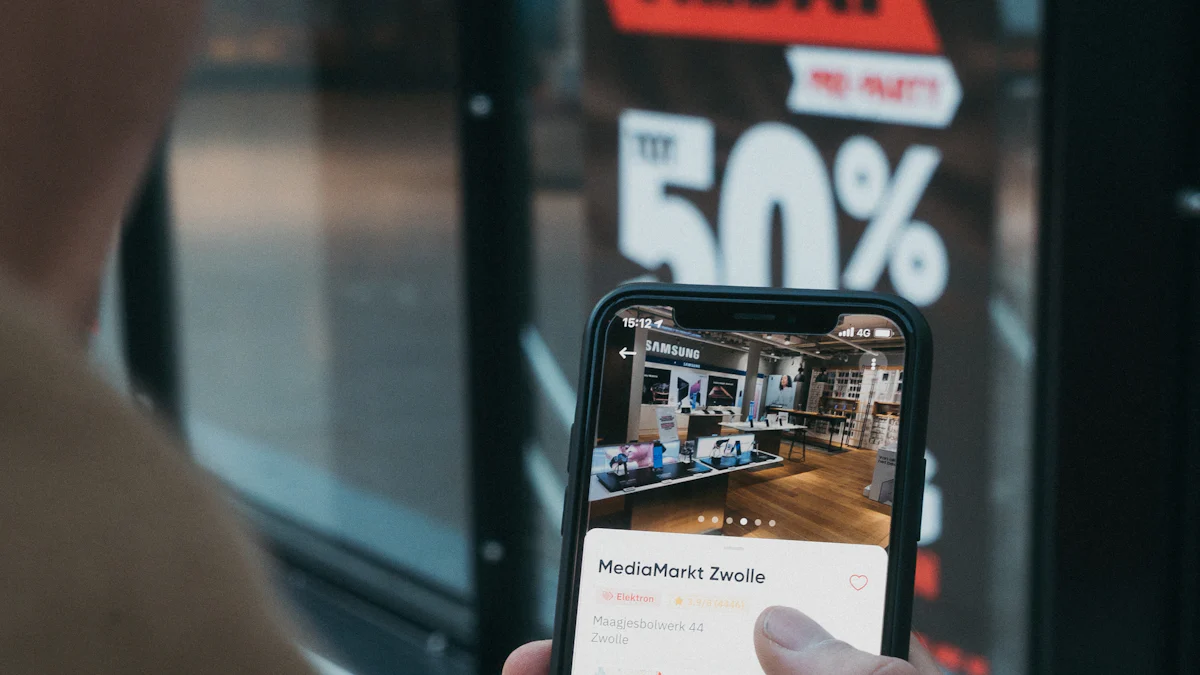2024 eCommerce Trends: The Rise of Shoppable Videos

Staying updated with eCommerce trends has become crucial for businesses aiming to thrive in the digital marketplace. The Future of eCommerce: Integrating Video Commerce Solutions is revolutionizing how consumers interact with online content. The rise of shoppable videos marks a significant shift, capturing viewers' attention and encouraging engagement, resulting in higher conversion rates compared to traditional advertisements. Shoppable videos transform passive viewing into active participation, allowing consumers to purchase items directly from the video. This trend signifies a new era in eCommerce, where entertainment seamlessly blends with shopping, creating an immersive and engaging experience for consumers. QuickCEP is an AI Agent Platform, providing innovative solutions that help businesses stay ahead in the competitive digital landscape.
The Evolution of eCommerce in 2024

Technological Advancements
AI and Machine Learning
AI and machine learning have become game-changers in the e-commerce landscape. These technologies enable businesses to analyze vast amounts of data quickly. AI can predict consumer behavior, optimize pricing strategies, and enhance customer service. Machine learning algorithms personalize shopping experiences by recommending products based on past purchases and browsing history. This level of personalization boosts customer satisfaction and loyalty.
Augmented Reality (AR) and Virtual Reality (VR)
AR and VR technologies are revolutionizing e-commerce by providing immersive shopping experiences. AR allows customers to visualize products in their own environment before making a purchase. For example, shoppers can see how furniture fits in their living room or how clothes look on them without trying them on physically. VR takes this a step further by creating virtual stores where customers can browse and shop as if they were in a physical store. These technologies enhance the shopping experience and reduce return rates.
Consumer Behavior Changes
Increased Mobile Shopping
Mobile shopping has seen a significant rise in recent years. Consumers prefer the convenience of shopping on their smartphones. Businesses must optimize their websites for mobile devices to cater to this growing trend. Mobile-friendly websites ensure a seamless shopping experience, leading to higher conversion rates. Mobile apps also play a crucial role in engaging customers and providing personalized experiences.
Demand for Personalized Experiences
Consumers now expect personalized shopping experiences. Businesses use customer data to tailor their marketing strategies and product recommendations. Personalization extends beyond product suggestions. It includes personalized emails, targeted ads, and customized shopping experiences. This approach increases customer engagement and drives sales. Companies that fail to offer personalized experiences risk losing customers to competitors who do.
The Rise of Shoppable Videos

What Are Shoppable Videos?
Definition and Examples
Shoppable videos blend engaging video content with direct shopping opportunities. These videos allow viewers to click on products featured in the video and purchase them instantly. This creates a seamless shopping experience. For example, fashion brands often use shoppable videos to showcase their latest collections. Viewers can see the clothes in action and buy them without leaving the video.
How They Work
Shoppable videos work by embedding clickable links or buttons within the video. These links direct viewers to product pages or checkout processes. Advanced technologies like AI and machine learning enhance this experience by personalizing product recommendations. This makes the shopping journey more intuitive and enjoyable. Platforms like Instagram and TikTok have popularized this format, making it a staple in modern e-commerce strategies.
Benefits of Shoppable Videos
Enhanced Customer Engagement
Shoppable videos captivate audiences by combining entertainment with shopping. This interactive format keeps viewers engaged longer compared to traditional ads. The immersive nature of these videos encourages viewers to explore products in-depth. This leads to higher engagement rates. Brands that use shoppable videos often see increased traffic and longer time spent on their websites. For instance, Meshki Fashion Boutique integrated shoppable videos into their landing pages. This strategy generated more traffic and increased the average time spent on their website.
Improved Conversion Rates
Shoppable videos streamline the purchasing process, reducing friction for consumers. This convenience boosts conversion rates significantly. Viewers can make purchases directly from the video without navigating through multiple pages. This simplicity translates to higher sales. Businesses that adopt shoppable videos often report improved conversion rates. The engaging format also builds trust and encourages repeat purchases.
Implementing Shoppable Videos in Your Strategy
Choosing the Right Platform
Selecting the right platform is crucial for the success of shoppable videos. Popular social media platforms like Instagram, TikTok, and YouTube offer robust tools for creating and sharing shoppable content. E-commerce platforms like Shopify and BigCommerce also provide integrations for shoppable videos. Businesses should choose platforms that align with their target audience and marketing goals.
Creating Engaging Content
Creating engaging content is key to the success of shoppable videos. High-quality visuals, compelling storytelling, and clear calls-to-action make videos more effective. Brands should focus on showcasing products in real-life scenarios. This helps viewers visualize how they can use the products. Collaborating with influencers can also enhance the appeal of shoppable videos. Influencers bring authenticity and reach a wider audience.
Measuring Success
Measuring the success of shoppable videos involves tracking key performance indicators (KPIs). Metrics like engagement rates, click-through rates, and conversion rates provide insights into the effectiveness of the videos. Tools like Google Analytics and CRM systems can help track these metrics. Businesses should regularly analyze the data to optimize their strategies. Continuous improvement ensures that shoppable videos remain a valuable part of the e-commerce strategy.
Other Emerging Trends in 2024
Social Commerce
Integration with Social Media Platforms
Social media platforms have become essential for e-commerce. Platforms like Instagram, TikTok, and Facebook now offer features that enable direct shopping. Users can discover products through posts, stories, and live streams. These platforms provide seamless integration for businesses to showcase their products. This integration enhances the shopping experience by making it more interactive and engaging.
Influencer Partnerships
Influencers play a significant role in social commerce. Brands collaborate with influencers to reach a broader audience. Influencers create authentic content that resonates with their followers. This partnership builds trust and loyalty among consumers. Influencers often use shoppable videos to promote products, making it easier for followers to purchase items directly. This strategy has proven effective in driving sales and increasing brand visibility.
Sustainability and Ethical Shopping
Eco-friendly Products
Consumers are increasingly mindful of sustainability. Many prefer brands that offer eco-friendly products. Businesses are responding by adopting sustainable practices. This includes using recyclable materials and reducing carbon footprints. According to a survey, nearly 80% of customers consider sustainability when making purchases. Brands that prioritize sustainability attract environmentally conscious consumers.
Transparent Supply Chains
Transparency in supply chains has become crucial. Consumers want to know where products come from and how they are made. Brands that provide this information build trust with their customers. Transparency involves sharing details about sourcing, manufacturing, and logistics. Blockchain technology can help track and verify these processes. This transparency ensures ethical practices and enhances brand reputation.
Omnichannel Retailing
Seamless Online and Offline Integration
Omnichannel retailing blends online and offline shopping experiences. Consumers expect a unified experience across all channels. Businesses must ensure that their online and physical stores complement each other. This integration includes features like BOPIS (Buy Online, Pick Up In-Store). BOPIS offers convenience and flexibility to customers. It also drives foot traffic to physical stores.
Unified Customer Experience
A unified customer experience is key to successful omnichannel retailing. Brands must provide consistent service across all touchpoints. This includes websites, mobile apps, and physical stores. Big data plays a crucial role in understanding customer behavior. Businesses use this data to personalize interactions and improve customer satisfaction. Chatbots improve shopping experiences by providing instant support and recommendations. This cohesive approach enhances customer loyalty and drives sales growth.
Staying updated with e-commerce trends is essential for businesses aiming to thrive in the digital marketplace. Shoppable videos have the potential to revolutionize the industry by transforming passive viewers into active participants. Guy Elliott emphasizes that these videos combine entertainment with direct shopping, creating a compelling digital experience. Businesses should explore and implement these trends to stay competitive. Livestream shopping and platforms like Instagram and Facebook Marketplace offer excellent opportunities for growth. Embrace these innovations to foster customer loyalty and drive e-commerce success.
See Also
Top 18 Video Platforms for Shopping in 2024
Boost E-Commerce with Product Videos in 2024
Top 12 Videos for E-Commerce Triumph


